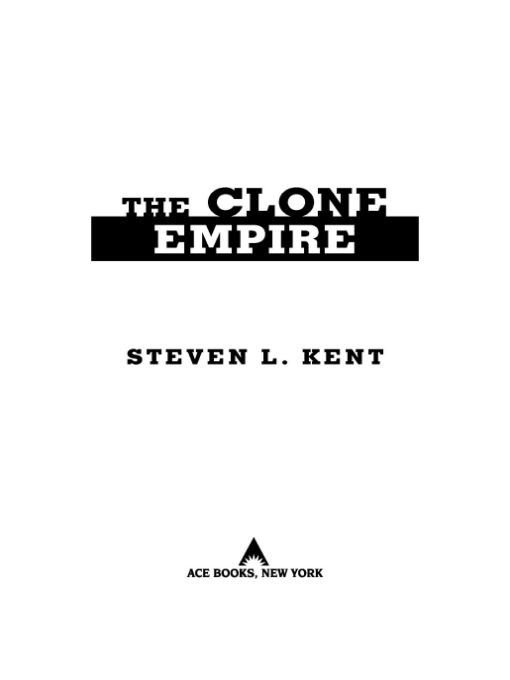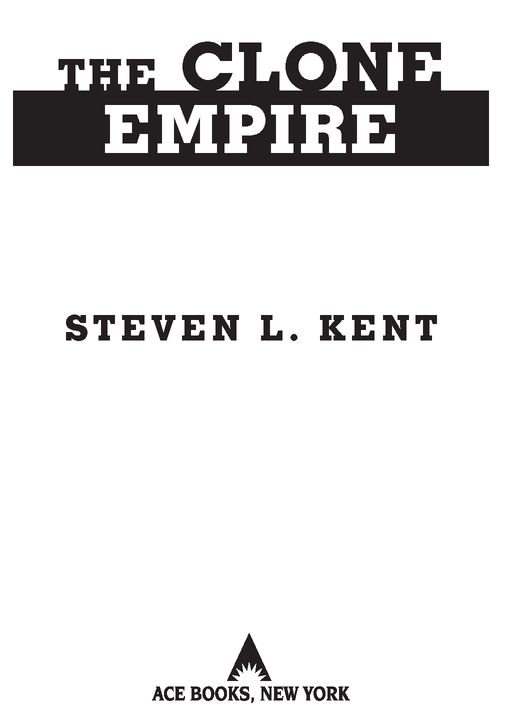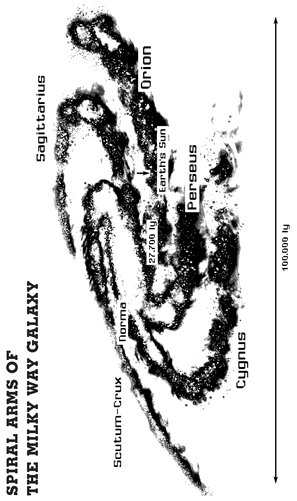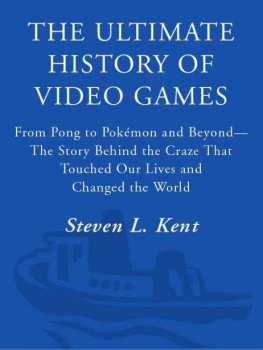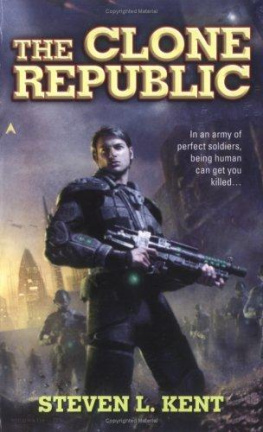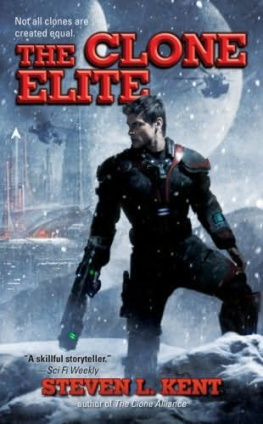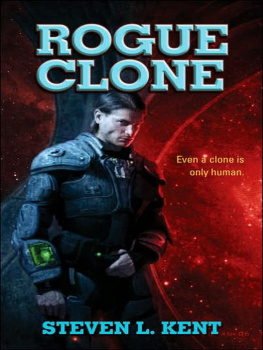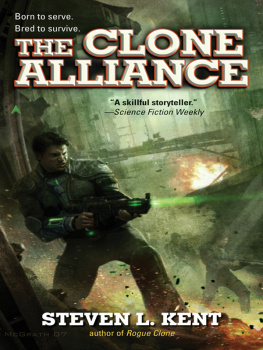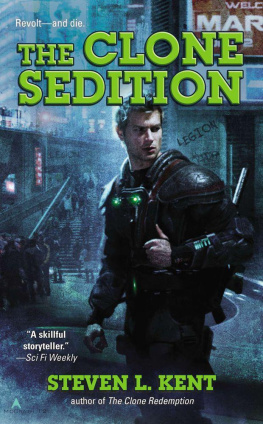Table of Contents
PRAISE FOR Steven L. Kent
THE CLONE ELITE
If you enjoy military science fiction, then this is the book for you... fast paced and hard-hitting. Punches, bullets, and nuclear bombs are not held back. The characters face hard choices and dont regret them after they are made.
SFRevu
THE CLONE ALLIANCE
Offers up stunning battle sequences, intriguing moral quandaries, and plenty of unexpected revelations... [a] fast-paced military SF book with plenty of well-scripted action and adventure, [and] a sympathetic narrator.
SF Site
ROGUE CLONE
Exciting space battles [and] haunting, quiet moments after war has taken its toll... Military SF fans looking for stories that combine mystery, action, espionage, politics, and some thoughtful doses of humanism in exploring their not entirely human characters would do well to add Steven L. Kent to their reading lists.
SF Reviews.net
THE CLONE REPUBLIC
A solid debut. Harris is an honest, engaging protagonist and thoughtful narrator, and Kents clean, transparent prose fits well with both the main character and the storys themes... Kent is a skillful storyteller, and the book entertains throughout.
Sci Fi Weekly
The first sentence gets you immediately... From there, the action begins fast and furious, with dark musings, lavish battle scenes, and complex characterizations... The Clone Republic feature[s] taut writing and a truly imaginative plot full of introspection and philosophizing.
The Village Voice
A character-driven epic that understands that the best war stories are really antiwar stories... a smartly conceived adventure.
SF Reviews.net
Ace Books by Steven L. Kent
THE CLONE REPUBLIC
ROGUE CLONE
THE CLONE ALLIANCE
THE CLONE ELITE
THE CLONE BETRAYAL
THE CLONE EMPIRE
This book is dedicated to Steve Baxter, who is an excellent friend.
Map by Steven J. Kent, adapted from a public domain NASA diagram
SIX EVENTS THAT SHAPED HISTORY: A Unified Authority Time Line
2010 TO 2018 DECLINE OF THE U.S. ECONOMY
Following the examples of Chevrolet, Oracle, IBM, and ConAgra Foods, Microsoft moves its headquarters from the United States to Shanghai. Referring to their company as a global corporation, Microsoft executives remain committed to U.S. prosperity, but with its burgeoning economy, China has become the companys most important market.
Even with Toyota and Hyundai increasing their manufacturing activities in the United Statesspurred on by the favorable cheap labor conditionsthe U.S. economy becomes dependent on the shipping of raw materials and farm goods.
Bottoming out as the worlds twelfth largest economy behind China, Korea, India, Cuba, the European Economic Community, Brazil, Mexico, Canada, Japan, South Africa, Israel, and Unincorporated France, the United States government focuses on maintaining its position as the worlds last military superpower.
JANUARY 3, 2026 INTRODUCTION OF BROADCAST PHYSICS
Armadillo Aerospace announces the discovery of broadcast physics, a new technology capable of translating matter into data waves that can be transmitted to any location instantaneously. This opens the way for pangalactic exploration without time dilation or the dangers of light-speed travel.
The United States creates the first-ever fleet of self-broadcasting ships, a scientific fleet designed to locate planets for colonization. When initial scouting reports suggest that the rest of the galaxy is uninhabited, politicians fire up public sentiment with talk about manifest destiny and spreading humanity across space.
The discovery of broadcast physics leads to the creation of the Broadcast Networka galactic superhighway consisting of satellites that send and receive ships across the galaxy. The Broadcast Network ushers in the age of galactic expansion.
JULY 4, 2110 RUSSIA AND KOREA SIGN A PACT WITH THE UNITED STATES
With the growth of its space-based economy, the United States reclaims its spot as the wealthiest nation on Earth. Russia and Korea become the first nations to sign the IGTA (Intergalactic Trade Accord), a treaty opening the way for other nations to become self-governing American territories and enjoy full partnership in the space-based economy.
In an effort to create a competing alliance, France unveils its Cousteau Oceanic Exploration program and announces plans to create undersea colonies. Only Tahiti signs on.
After the other nations of the European Economic Union, Japan, and all of Africa become members of the IGTA, France discontinues its undersea colonization and joins the IGTA. Several nations, most notably China and Afghanistan, refuse to sign, leading to a minor world war in which the final holdouts are coerced into signing the treaty.
More than 80 percent of the worlds population is eventually sent to establish colonies throughout the galaxy.
JULY 4, 2250 TRANSMOGRIFICATION OF THE UNITED STATES
With most of its citizens living off Earth, the IGTA is renamed The Unified Authority and restructured to serve as a government rather than an economic union.
The government of the Unified Authority bases its rule on a new manifesto that merges principles from the U.S. Constitution with concepts from Platos Republic. In accordance with Platos ideals, society is broken into three stratacitizenry, defense, and governance.
With forty self-sustaining colonies across the galaxy, Earth becomes the political center of a new republic. The eastern seaboard of the former United States develops into an ever-growing capital city populated by the political class, families appointed to run the government in perpetuity.
Earth also becomes home to the military class. After some experimentation, the Unified Authority adopts an all-clone conscription model to fulfill its growing need for soldiers. Clone farms euphemistically known as orphanages are established around Earth. These orphanages produce more than a million cloned recruits per year.
The military does not commission clone officers. The officer corps is drafted from the ruling class. When the children of politicians are drummed out of school or deemed unsuitable for politics, they are sent to officer-candidate school in Australia.
2452 TO 2512 UPRISING IN THE GALACTIC EYE
On October 29, 2452, a date later known as the new Black Tuesday, a fleet of scientific exploration ships vanishes in the galactic eye region of the Norma Arm.
Fearing an alien attack, the U.A. Senate calls for the creation of the Galactic Central Fleet, a self-broadcasting armada. Work on the Galactic Central Fleet is completed in 2455. The newly christened fleet travels to the Inner Curve, where it vanishes as well.
Having authorized the development of a top secret line of cloned soldiers called Liberators, the Linear Committeethe executive branch of the U.A. governmentapproves sending an invasion force into the Galactic Eye to attack all hostile threats. The Liberators discover a human colony led by Morgan Atkins, a powerful senator who disappeared with the Galactic Central Fleet. The Liberators overthrow the colony, but Atkins and many of his followers escape in G.C. Fleet ships.

